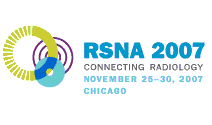
Abstract Archives of the RSNA, 2007
SSG20-03
Noncontrast MRA of the Pulmonary Veins Using a Free-breathing, Segmented, Whole Chest SSFP Sequence
Scientific Papers
Presented on November 27, 2007
Presented as part of SSG20: Cardiac (MR)
Christopher Jean-Pierre Francois MD, Presenter: Nothing to Disclose
Vibhas Deshpande PhD, Abstract Co-Author: Researcher, Siemens AG
Renate Jerecic, Abstract Co-Author: Employee, Siemens AG
Peter Weale, Abstract Co-Author: Researcher, Siemens AG
James Christopher Carr MD, Abstract Co-Author: Advisory Board, Bayer AG (Berlex Inc)
Advisory Board, Vital Images, Inc
Assess feasibility of a non contrast MRA technique for evaluation of pulmonary veins (PV) using a non-selective, segmented 3D SSFP technique with motion adaptive respiratory navigators.
Clinical pulmonary vein MRA studies performed in 20 patients pre and post RF ablation on a 1.5T scanner were retrospectively reviewed. CEMRA was performed using a dynamic, time-resolved 3D FLASH sequence (3.6s per 3D dataset, 1.25 x 1.8 x 1.8 mm resolution). Non-contrast enhanced MRA was peformed with a free-breathing, T2-prepared, segmented 3D SSFP sequence applied to the entire chest (1.6 × 1.6 x 1.5 mm resolution). A motion adaptive navigator echo scheme was used to optimize scan efficiency. Qualitative analysis was performed by two reviewers. Images were evaluated for conspicuity of the PV (1 nondiagnostic, 2 poor, 3 fair, 4 good, and 5 excellent). The number of PV and the presence of non-cardiac pathology were recorded. Orthogonal, transaxial measurements of the PV were performed in each patient for each sequence. The correlation coefficient and the mean difference between the diameters measured using CEMRA images and 3D TrueFISP images were determined.
The time to acquire the 3D SSFP datasets was 10.1 +/- 4.5 minutes. Orthogonal measurements of the PV made with the 3D-SSFP datasets correlated well with those made with the CEMRA datasets (r = 0.94). Bland-Altman analysis revealed a mean measured difference (3D SSFP minus CEMRA) in PV diameter between the two techniques of -0.02 +/- 0.25 cm. Comparison of the two techniques by the two observers revealed no significant difference between the techniques in demonstrating the PV (P < 0.05), with an average observer score of 4.61 (out of 5) for CEMRA and 4.22 (out of 5) for 3D SSFP. 10 patients had extra-cardiac pathology seen with 3D SSFP images but not on the CEMRA images.
Non contrast, whole chest 3D SSFP MRA provides diagnostic quality images of the PV. PV measurements made with this technique correlate very well with those made with the CEMRA technique and can detect important extra-cardiac pathology.
For patients with a contraindication to Gadolinium-containing contrast agents, 3D SSFP MRA is a viable alternative.
Francois, C,
Deshpande, V,
Jerecic, R,
Weale, P,
Carr, J,
Noncontrast MRA of the Pulmonary Veins Using a Free-breathing, Segmented, Whole Chest SSFP Sequence. Radiological Society of North America 2007 Scientific Assembly and Annual Meeting, November 25 - November 30, 2007 ,Chicago IL.
http://archive.rsna.org/2007/5007736.html

